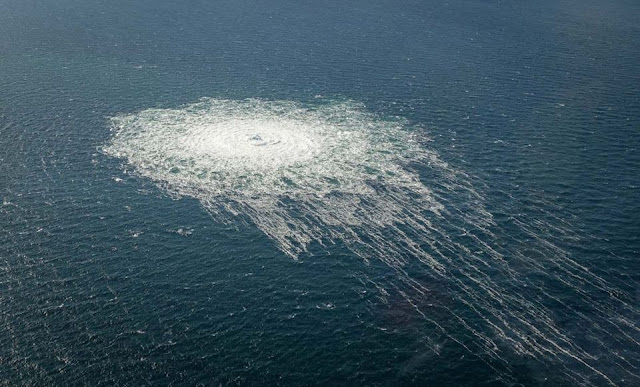The EU thinks that sabotage is probably to blame for the leaky Russian gas pipelines
A "robust and united response" would be given to any deliberate disruption of the EU's energy infrastructure, its top diplomat was quoted as saying on Wednesday after several nations claimed two Russian gas pipelines to Europe were attacked.
Who might be responsible for the leaks or any suspected wrongdoing on the Nord Stream pipelines, which Russia and its European partners spent billions of dollars constructing, remained a mystery as gas continued to pour into the Baltic Sea.
Russia, which reduced gas shipments to Europe in response to Western sanctions over Moscow's invasion of Ukraine, has also suggested that sabotage may have occurred and that the leaks jeopardized the security of the continent's energy supply.
According to Josep Borrell, the European Union shares the view expressed on Tuesday by Germany, Denmark, and Sweden that sabotage was likely to blame for the leaks discovered on Monday in the Nord Stream pipelines. The EU has not identified a potential offender or offered a theory as to why it occurred.
According to ntv, Borrell stated that "any deliberate disruption of European energy infrastructure is utterly unacceptable and will be met with a robust and united response."
After meeting with NATO General Secretary Jens Stoltenberg in Brussels on Wednesday, Denmark's defense minister said there was cause for concern regarding the security situation in the Baltic Sea region.
In a statement, Morten Bodskov stated that "Russia has a sizable military presence in the Baltic Sea region and we expect them to continue their sabre-rattling."
Magdalena Andersson, the prime minister of Sweden, announced at a press conference on Tuesday that two explosions had been discovered in connection with the leaks. Despite the fact that this was not an attack on Sweden, it was in close contact with allies like NATO and neighbors like Germany and Denmark.
 |
| Both Moscow and the leaders of Europe claim that sabotage cannot be ruled out. Map showing the locations of leaks on the Nord Stream pipelines |
In the vicinity of the leaks on Monday, two powerful explosions were noted by seismologists in Denmark and Sweden; the explosions occurred in the water rather than beneath the seabed.
The Nord Stream pipelines have been focal points in an escalating energy conflict between Moscow and European capitals that has hurt the economies of the West as a whole, driven up gas prices, and sparked a search for alternative sources of energy.
Despite the fact that neither pipeline was pumping gas when the leaks were discovered, the incidents dash any last-minute hopes that Europe would receive fuel through Nord Stream 1 before winter.
While Gazprom (GAZP.MM), the Russian-controlled company with a monopoly on its gas exports by pipeline, has declined to comment, operator Nord Stream has called the damage "unprecedented."
In response to the leaks and reports of drone activity in the North Sea, Norway announced that security at its oil and gas installations would be strengthened, and Danish authorities requested that the level of preparedness in their power and gas sector be increased.
Russia cut back on gas shipments to Europe through Nord Stream 1 before completely stopping them in August, blaming technical difficulties on Western sanctions. Politicians in Europe claim that was a pretext for stopping the supply of gas.
The brand-new Nord Stream 2 pipeline had not yet begun conducting business. Days before Russia sent troops into Ukraine in February for what Moscow refers to as a "special military operation," Germany abandoned its plan to use it as a gas supply.
Following the leaks' discovery, gas prices in Europe increased. On Wednesday, the benchmark October Dutch price increased 11% to 204.50 euros per megawatt hour. Even though prices have dropped from their highs for the year, they are still more than 200% higher than they were in early September 2021.
The chief executive of Naftogaz announced on Wednesday that the Ukrainian energy company will continue its arbitration proceedings against Gazprom over the Russian natural gas that transits the nation, adding another twist to the saga surrounding Europe's gas supply.
On Tuesday, Gazprom stated that while it would reject all of Naftogaz's claims in the arbitration, if the company continued to pursue the matter, sanctions could be imposed.


